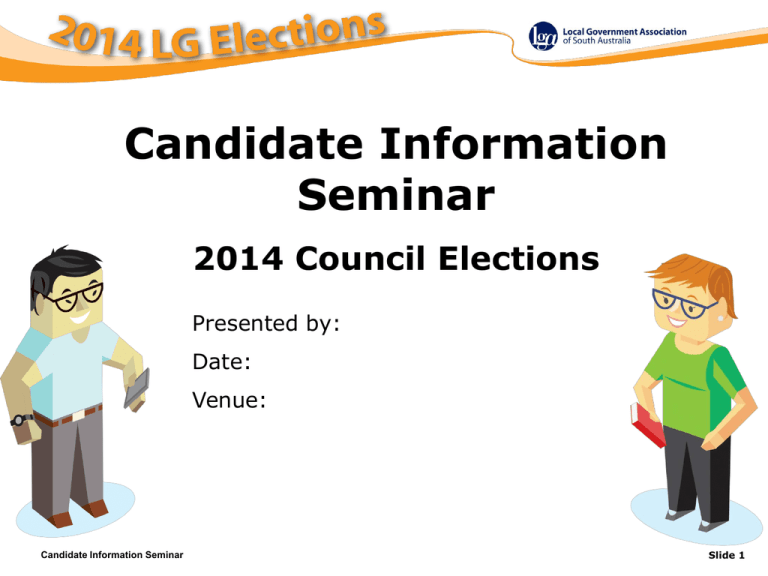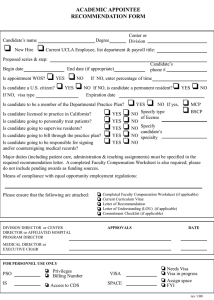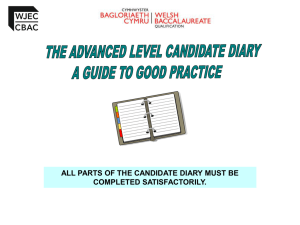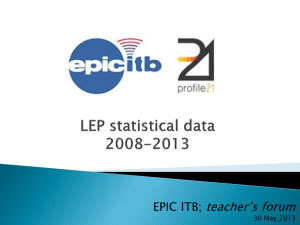2014 Candidate Information Seminars
advertisement

Candidate Information TITLE OF Seminar PRESENTATION 2014 Council Elections Presented by: Date: Venue: Candidate Information Seminar Slide 1 The role and functions of a Council Local Government Act 1999 s6, s7 & s8 • Being a representative, informed and responsible decision-maker in the interests of its community • Participating in public policy development and planning activities with the other spheres of Government • Providing and co-ordinating services and facilities that benefit its area, ratepayers, residents and visitors Candidate Information Seminar Slide 2 The role and functions of a Council Local Government Act 1999 s6, s7 & s8 • developing its community and resources in a socially just and sustainable manner • providing for the welfare, well-being and interests of individual and groups within its community Candidate Information Seminar Slide 3 The role and functions of a Council Local Government Act 1999 s6, s7 & s8 • Representing the interests of its community to the wider community and other levels of Government. • Planning at the local and regional level for the development and future requirements of its area. • Managing, developing, protecting and conserving the environment. • Regulating local activities such as building, keeping animals, parking, maintaining public health etc. Some of these responsibilities include a law enforcement role. Candidate Information Seminar Slide 4 The role of each sphere Federal State Local National Issues Income Tax Customs Postal Services Telecommunications State Issues Arterial Road * State Transport * Education Social Welfare (part) * Defence Foreign Affairs Police Primary & Secondary Industries State Planning * Health * Local Issues Local Roads Community Services Local Area Planning Development/Building Control Recreation Local Health * National Transport Social Welfare (part) * Etc Etc Libraries & Information Council Rates Etc There are many areas of overlap between the three spheres * Joint Responsibility Candidate Information Seminar Slide 5 Relationship to other spheres of Government Councils work within the following inter-relationship with other spheres of government Local Independence Interdependence Dependence State Candidate Information Seminar Federal Slide 6 Local Government Relationship with State & Federal Governments 68 Councils in South Australia Regional Bodies State Government Local Government Association of SA Australian Local Government Association Candidate Information Seminar Federal Government Slide 7 In practice, what Councils do • Governance • Leadership • Representation of the community • Community planning & co-ordination • Community participation • Decision making • Service provision • Regulation • Policy and planning with State and Federal Governments Candidate Information Seminar Slide 8 Means of achieving this • Revenue raising • Resources – Community Assets • Employment of staff • Contracting • Community leadership • Volunteer programs • Community development • Capital Equipment • Information Candidate Information Seminar Slide 9 Option for Wards • Council areas may be divided into wards • Wards are electoral divisions for election of Council members • If Council area is divided into wards, number of people represented by a Council Member (the ward quota) must not vary by more than 10% from other wards. Candidate Information Seminar Slide 10 Role of the Principal Member • Preside at meetings of the Council • Carry out civic and ceremonial duties • Provide advice, if required, to the CEO between Council meetings regarding a decision of the Council • Act as the principal spokesperson of the Council • Deputy Mayor/Chairperson undertakes the role in absence of Principal Member. Candidate Information Seminar Slide 11 Role of a Council Member Local Government Act 1999 – s69 • Member of Governing body – decisions through Council as a whole • Represent the interests of all residents and ratepayers in the area. • Provide community leadership and guidance • Facilitate communication between the community and the Council These duties are also undertaken by the Mayor or Chairperson Candidate Information Seminar Slide 12 Role of a Council Member - Continued • Participate in Council debates, policy making and planning for the area. • Review Council’s strategic and financial plan to ensure they are appropriate and effective. • Review the Council's resource allocation, expenditure and activities, and effectiveness of its service delivery • Membership of Council Committees and/or Council Development Assessment Panel. Candidate Information Seminar Slide 13 Development Assessment Panels Council is a ‘relevant authority’ under Development Act 1993 Required to establish a Council Development Assessment Panel • Assess and determine development applications • Operate and decisions solely under Development Act, not Local Government Act • Distinct from other functions of Council. Candidate Information Seminar Slide 14 Role of the CEO and Staff Local Government Act 1999 - s99 CEO responsible for staff matters and ensuring implementation of Council’s plans and policies. • Assist Council Members in their policy and decision making process • Provide advice and guidance of a professional, technical or social nature • Action the business of Council on behalf of the elected body Candidate Information Seminar Slide 15 Role of the CEO and Staff - continued • Provide for the good management of Council’s resources and ensure services are effective • Operate within the policies of Council • The CEO has specific responsibility for staff management • On some issues relevant to the Senior Executive Officer, the CEO is required to consult with Council (Recruitment and selection) Candidate Information Seminar Slide 16 Respective Roles Council Members Senior Officers Representing Community interests Advising Policy Making Delegating Reviewing Administering Accounting Supervising Council Members have no legal role independent of the Council. It is the "body corporate" that makes the decisions of Council Candidate Information Seminar Slide 17 What it takes to be an effective Council Member • Energy • Courage to try • Dedication • Desire to make things happen • Genuine concern for the wellbeing of the community • Ability to communicate Candidate Information Seminar • Understanding of the job • Willingness to learn new ways of doing things. Slide 18 What it takes to be an effective Council Member - continued • Keep in touch with the community • Be the community voice • Prepare for meetings • Attend meetings • Commitment to the role BUT • Look after your health • Recognise the limits you can physically and mentally cope with Candidate Information Seminar Slide 19 Allowances and Expenses • Council Members are entitled to an annual allowance and reimbursement of expenses • Levels of allowances are determined by the independent Remuneration Tribunal • The Remuneration Tribunal determination (July 2014) provides for allowances: - Between $5 700 pa and $21 500 pa for Council Members (4x for Principle Members), depending on the Group in which the Council sits - Annual CPI adjustment. * A copy of the Remuneration Tribunal determination is available at http://www.remtribunal.sa.gov.au/determinations/local-governmentallowances; Candidate Information Seminar Slide 20 Legal Issues • Code of Conduct • Register of Interests • Conflict of Interest • Protection of Members – civil liability Candidate Information Seminar Slide 21 Periodic Elections The Local Government (Elections) Act 1999 provides that periodic elections to determine the membership of Council must be held at intervals of 4 years. • A periodic election is held by voluntary postal voting • Close of voting for 2014 LG elections is 5pm on Friday 7 November Candidate Information Seminar Slide 22 Failure of an Election An election wholly fails if: • The election is for one vacancy and between the close of nominations and the close of voting, a nominated candidate dies; or • The election is for two or more vacancies and between the close of nominations and the close of voting, two or more candidates die. NOTE: a nominated candidate may only withdraw before the close of nominations Candidate Information Seminar Slide 23 Criteria for Election to Council • Over 18 • An Australian citizen; or • a prescribed person who had been a member of a Council between 5 May 1997 & 1 January 2000; and • an elector for the area; or • a designated person representing a body corporate or group which has its name on the voters roll • Be on the voters roll Candidate Information Seminar Slide 24 Who is ineligible • a State or Federal Parliamentarian • an un-discharged bankrupt disqualified from holding office • an employee of the Council • a nominee for office in another Council area • been sentenced to imprisonment or could become liable to serve the remainder of the sentence Candidate Information Seminar Slide 25 Nominating for Council • Collect a nomination kit from the Council • Complete the nomination form and prepare the Candidate Profile • Lodge the nomination form, Candidate Profile and candidate photograph (optional) with the Council’s Deputy Returning Officer/Council Liaison Officer after nominations open on 2 September and before nominations close at 12 noon on Tuesday 16 September 2014 Candidate Information Seminar Slide 26 Candidate Profile • must be typed or printed • not exceed 150 words in length • be accurate and not be misleading; • not contain offensive or obscene material • must not refer to another person who has nominated as a candidate without their written consent • must not comment on decisions or actions taken by the Council or of past or present Members of the Council • must be signed and dated Candidate Information Seminar Slide 27 Candidate Website • Established by LGA under s.19A of LG (Elections) Act 1999 • Contains the mandatory information submitted to the Electoral Commission on the nomination form including the candidate ‘profile’ (usually accompanied by a photo) • Contains an optional candidate ‘statement’ in the form of a hyperlink. Candidate Information Seminar Slide 28 Withdrawing of Nominations To withdraw you must complete the appropriate form prior to the close of nominations. Candidate Information Seminar Slide 29 Rejection of Nomination The Returning Officer may reject a nomination if in their opinion the name under which the candidate is nominated: • is obscene: or • is frivolous; or • has been assumed for an ulterior purpose; or • no profile has been submitted. Candidate Information Seminar Slide 30 Publication of nominations • Upon receipt of nominations, they are displayed in the Council offices. • After close of nominations and within 16 days, nomination must be published. This usually occurs within 14 days due to the publication dates of the Government Gazette. • The public notice will include the names of candidates and the positions they have nominated for. • Whether in fact, an election is required. Candidate Information Seminar Slide 31 No contest If there are the same number of positions as candidates, those nominating will automatically be elected to the position Candidate Information Seminar Slide 32 Electoral Material Must contain • The name and address of the person authorising the material • If the material is printed, the name and address of the printer • If the material is published in a newspaper as a letter to the editor, the name and address of the writer • MUST NOT contain inaccurate and misleading statements purporting to be fact Candidate Information Seminar Slide 33 Illegal Practices The Local Government (Elections) Act 1999 outlines a number of illegal practices including: • Violence, Intimidation and Bribery • Dishonest artifices • Interference with Statutory Rights • Attempting to discover how people voted Candidate Information Seminar Slide 34 Points to consider when campaigning • Consider the issue/s you will promote during the campaign • Consider how best to promote yourself - flyer, door knocking, stands at shopping centres, local media • Plan your campaign strategy • Read and comply with LGA Guidelines prior to affixing electoral signs eg on ETSA poles. Candidate Information Seminar Slide 35 Points to consider when campaigning - continued All candidates must declare campaign donations within 30 days after the election (win or lose) Before the close of voting – 7 November 2014 • Select and nominate scrutineers • Plan for the celebrations after you are elected Candidate Information Seminar Slide 36 Resources available to Candidates Local • • • • Government Association of SA Ph: 8224 2000 Email: lgasa@lga.sa.gov.au Website: www.lga.sa.gov.au On the job training and support for Councillors Electoral Commission of SA • Ph: 7424 7400 • Email: ECSAComments@sa.gov.au • Website: www.ecsa.sa.gov.au Candidate Information Seminar Slide 37







